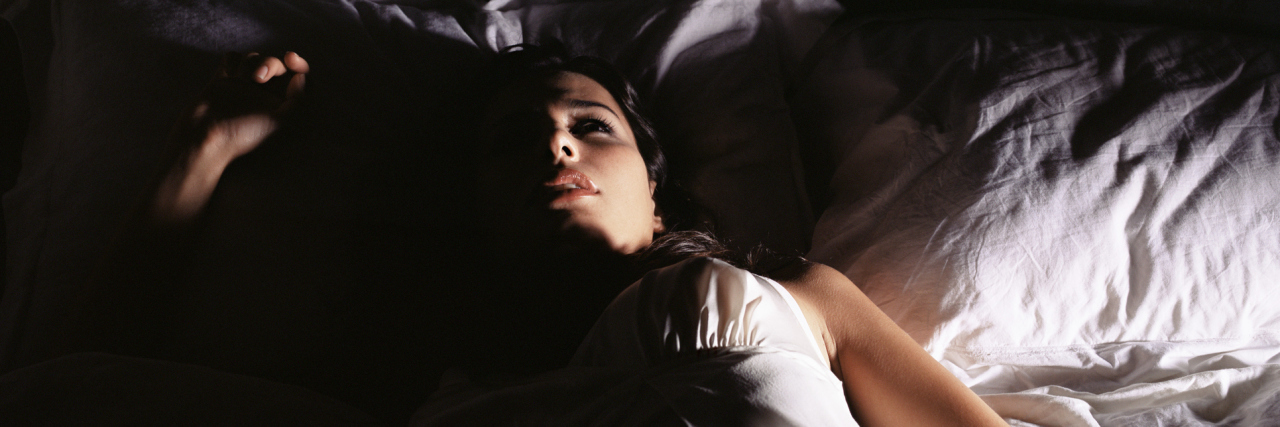12 Things I Do to Manage My Insomnia
Editor's Note
Any medical information included is based on a personal experience. For questions or concerns regarding health, please consult a doctor or medical professional.
Does fibromyalgia cause insomnia or does insomnia cause fibromyalgia? I do not have a definitive answer. However, I do know that insomnia can wreak havoc on health and well-being.
- What is Fibromyalgia?
- What Are Common Fibromyalgia Symptoms?
I first experienced fibromyalgia in 2003, and insomnia took hold of my life for seven long years. Fifteen years later, my lifestyle has completely changed and I have embarked on a new life path, embracing a slower pace of life, as per the title of my memoir “Watching the Daisies – Life Lessons on the Importance of Slow.”
The top tips that have helped heal my insomnia:
1. Limit sugar, caffeine and alcohol
Sugar and caffeine are both stimulants. Eating sugar causes a spike in blood glucose levels, causing an immediate stimulation of the brain. Caffeine acts on the central nervous system to increase alertness and attention. It can stay in your system for up to 12 hours – not so good if you are prone to insomnia! Alcohol may help you fall asleep more quickly, but you will spend less time in a deep sleep, and more time in the less restful REM or rapid eye movement stage of sleep. In addition you may have to visit the toilet more often during the night…
2. Avoid exercising close to bedtime
The jury is divided on whether exercising before bedtime affects sleep quality. If you struggle with insomnia, it is worth experimenting on exercising at different times of the day. Personally, I find exercising in the evening delays sleep and impairs my sleep quality. I avoid it completely.
3. Avoid watching television, using a computer or mobile phone before bedtime
In the evening, our bodies produce a hormone called melatonin that helps us feel sleepy, fall asleep and stay asleep till daylight. It then naturally dissipates. However, televisions, computers and mobile phones emit blue light, which can prevent the body from producing melatonin. If you struggle with insomnia you may find it helpful to avoid watching television, using a computer or mobile phone two to three hours before bedtime. Bloggers, please take note!
4. Keep to a regular bedtime
Our brains and bodies are subject to a circadian rhythm which regulates our sleeping patterns, our energy levels and appetite…
I was born a lark, and always feel better going to bed and waking up early. Sadly, I find even occasional late nights a problem, as my circadian rhythm takes a very long time to return to its usual balance. Sometimes, I decide it is simply not worth it.
5. Epsom salt baths
Epsom salts are rich in the mineral magnesium, which helps to regulate neurotransmitters responsible for calming the body and the mind. Magnesium also regulates melatonin levels. I find Epsom salt baths help my muscles to relax, and aid restful sleep. Magnesium supplements are also worth considering. I include magnesium in my daily vitamin and mineral support; I do not thrive without it.
6. Keep your bedroom free of clutter
One of the insights I gained through my years as a natural medicines therapist was that CHI, or energy, needs to have a clear channel to flow in both our bodies, our homes and our workplace.
Clutter impedes the flow of CHI and can contribute to a busy mind, poor quality sleep, blockages in our career, the flow of abundance… If you struggle with insomnia, please consider having a major clutter clear out in your bedroom and removing excess books, furniture, clothes lying on the floor… A calm environment aids a calm mind.
7. Keep electronic equipment out of the bedroom
I have already touched on the detrimental effects of televisions, computers and mobile phones on sleep quality. If you are finding it difficult to sleep, please consider removing electronic equipment from your bedroom.
8. Decorate your bedroom in restful hues
Bright colors in your bedroom will stimulate your mind, and are not conducive to restful sleep. If you are an insomniac, consider letting go of bright yellow, orange or red walls… A restful or pastel palette of duck egg blue, pink, pale grey, lilacs, soft greens can help you sleep more soundly.
9. Invest in a good quality bed and bedding
We spend approximately one-third of our lives asleep, therefore it is worth spending a little extra on a good quality bed. I use hypoallergenic bedding, which I wash in environmentally friendly products. It helps my breathing and promotes good quality sleep. Invest in your well-being. You are worth it.
10. Keep a journal by your bedside
As an author and blogger, I often find I get my best creative ideas just before I nod off. I write them down immediately, lest I forget! I also add any “to-do” thoughts that surface and jot those down too.
11. Cultivate an attitude of gratitude
Life can be tough at times, but cultivating an attitude of gratitude has helped me through life’s ups and downs. I write a note of 10 good things each and every day in my journal, no matter how small. If life is challenging, I remind myself that: “This too shall pass.”
12. Natural medicines
Acupuncture, herbal medicine, creative visualization, reflexology, flower remedies and emotional freedom technique have all helped me in healing my insomnia. Emotional freedom technique, known as EFT, is particularly useful for me. You can even practice it in bed while lying down. The website www.emofree.com has free tutorials on this simple yet powerful healing technique.
Getty Image by Image Source

